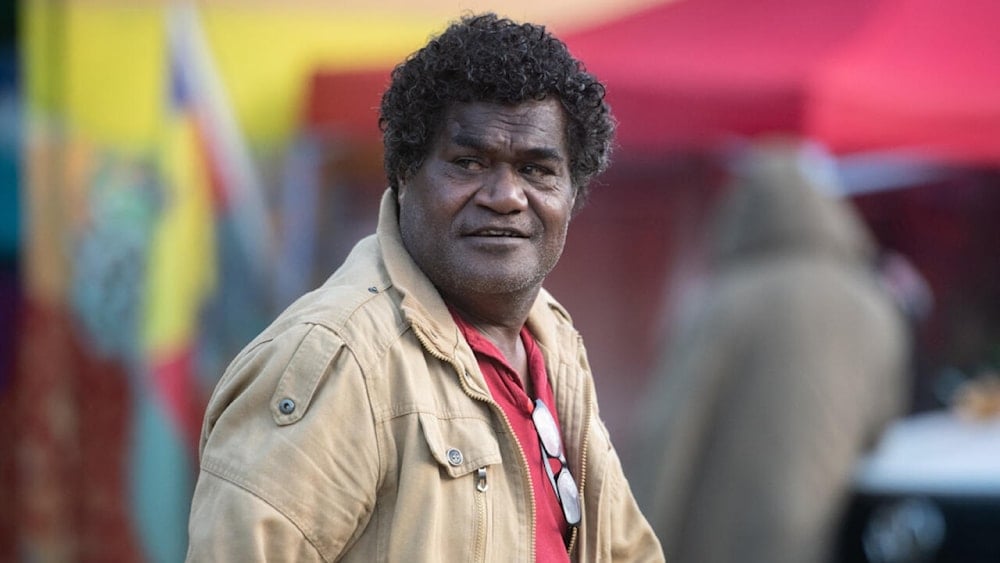France accused of blocking Kanak leader’s return to New Caledonia
Kanak leader Christian Tein remains stranded in France months after court clearance, as rights groups question delays and Kanak activists decry mistreatment.
-

Kanak leader Christian Tein is seen here in New Caledonia, June 14, 2024. (AFP)
Christian Tein, a prominent Kanak pro-independence activist from New Caledonia, has accused the French government of intentionally stalling the renewal of his passport, effectively preventing him from returning home. Christian Tein was cleared to go back by a Paris appeals court in October, but he remains stranded in France more than a year after his arrest.
Arrested in June 2024, Tein was flown more than 10,000 miles to mainland France aboard a private charter and held in solitary confinement for a year.
He faced multiple charges, including complicity in attempted murder, allegations he denies. While most of the charges have since been dropped, French authorities have yet to issue him a new passport.
“They are deliberately dragging it out,” Tein said, accusing officials of prolonging his forced stay in the country.
Detention and political backdrop
Now residing in Alsace, Tein remains under investigation for alleged conspiracy and organised robbery. He described his incarceration as deeply traumatic. “Very, very hard,” he said, calling the experience psychologically scarring.
His case is unfolding in the shadow of tensions in New Caledonia, where violent unrest erupted in 2024 after President Emmanuel Macron attempted to broaden voting rights for long-term French residents. The protests have since subsided.
Kanak leaders warned the move would dilute the Indigenous vote and jeopardize independence efforts. Fourteen people, most of them Kanak, were killed in the clashes, prompting France to impose a state of emergency and transfer dozens of detainees to the mainland.
According to Johann Bihr of the International Prison Observatory, many in the territory viewed the mass transfers as a form of colonial-era “deportation.” French magistrates later found no evidence that Tein was plotting an armed uprising. He maintains that authorities sought “to isolate me from my country.”
Wider context
Tein, who hails from the indigenous Kanak community, leads the Field Action Coordination Cell (CCAT), a group French authorities accused of organizing the May 2024 riots. Those protests erupted after France's National Assembly approved electoral reforms that would expand local voting rights to newer French residents.
The Kanak population, comprising about 41 percent of New Caledonia’s 271,000 people, saw the measure as a threat to their political weight and independence aspirations. The reforms were widely denounced as undermining the 1998 Nouméa Accord, which limited provincial voting rights to long-term residents and their descendants.
When violent demonstrations broke out on May 13, 2024, they quickly escalated into widespread rioting, looting, and arson. The unrest left at least 14 people dead, including two French police officers, and caused an estimated €2.2 billion in damages. Paris declared a state of emergency and deployed 3,000 troops and police to restore order.
While detained, Tein was elected president of the Kanak and Socialist National Liberation Front (FLNKS), the coalition spearheading the independence struggle since the 1980s. The FLNKS has consistently rejected compromise models short of full sovereignty, framing the struggle as one of decolonization and indigenous rights.
Macron Backs Down, but Tein Remains Excluded
Following the unrest, Macron scrapped the controversial voting reforms and signed the Bougival accord, granting limited autonomy to New Caledonia while reaffirming French control. Tein, now president of the Kanak National and Socialist Liberation Front (FLNKS), was not included in the negotiations.
“We reject Bougival, but I need to be at the table to discuss the future of the country,” he said.
Human rights groups and lawyers have raised an alarm over the treatment of other Kanak detainees. Guillaume Vama, a well-known agroforestry expert, recounted being arrested at gunpoint, hooded, and held in handcuffs for 96 hours before being flown to a French prison. He described the experience as “dehumanised.”
Tein’s legal team argues the passport delay amounts to an unlawful restriction on his freedom of movement. They point out that French authorities had issued a temporary passport “in record time” to facilitate his transfer to France, but are now withholding documentation to prevent his return.
Tein, who had never set foot in mainland France prior to his arrest, insists his commitment to independence remains unchanged.
“I am 57 years old, and I don’t think I have the right to pass this problem on to future generations. [Independence] is our only ambition,” he stressed.
France annexed New Caledonia in 1853, and the Kanak people have since endured decades of dispossession and marginalization under colonial rule. Despite the Nouméa Accord granting increased autonomy and three referendums on independence, all votes, held in 2018, 2020, and 2021, rejected secession.

 5 Min Read
5 Min Read










